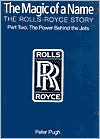

 |

|

The average rating for The Magic of a Name: The Rolls-Royce Story - The First Forty Years based on 2 reviews is 3.5 stars.
Review # 1 was written on 2017-03-12 00:00:00 Donald Sherry Donald Sherry"Rolls-Royce - The Magic of a Name" is a robustly researched compendium that illustrates the first forty years of what is evidently the most recognised name in engines and automobiles. It details the journeys, and friendship of two men with remarkably different characters, Henry Royce and Charles Rolls, and how both came together despite these dissimilarities, to conceive the most prestigious British brand today. Of particular interest is the role that Rolls-Royce played in British aviation history, and how instrumental its engines were in pivotal air battles of the Second World War. |
Review # 2 was written on 2019-01-21 00:00:00 William Burke William BurkeIf you're expecting a scintillating narrative to keep the pages turning, then replace this book with something lighter. Pugh may have read all the books in the bibliography, maybe even knows them rote fashion, because his book is almost more citations than original commentary. That problem is compounded by the text being quite small, and even smaller still for the citations, which just makes it hard to read. He got off to a bad start for me by explaining in tedious detail why he had decided to use the name of another tome on the same subject as his subtitle, and then kept quoting great slabs of it to fill out his pages. The next complaint I have is that the material is presented in a jumbled fashion, jumping back and forth between the years and from people to people. Speaking of people, the book starts out describing the main characters, Royce and Rolls, and others I had never hear of, but in doing so, set the whole fashion for the book: namely tell one man's story and all the supporting evidence, then tell another's, which naturally includes all the previous information, and on and on. Having said that, I would have to assume that he is setting out to create the definitive volume on the subject of RR, and for an aficionado, he may well have done it. The third fault i find with this book is that from time to time he interjects into the tsunami of facts and quotes with what I can only suppose is his own original take on a subject, but which he leaves totally unsupported. The best example is when he describes Goering watching the flames of London as it burns from his (and in Pugh's estimation, wrongly directed) bombs, and , I assume again, trying to channel Nero watching as Rome burned, from the cliffs of Calais. Pugh steps up and intones in the most assured manner that Goering may have enjoyed the sight, but had no idea that he had just lost the war (WWII). How can he make such a statement? He backs it up later with a similar quip that the Germans knew the war was lost when British planes were seen over Paris or some such drivel. Why did I read it all the way to the end, only skipping the bibliography and the raft of biographies that he kindly enclosed. In the paraphrased words of some unknown, reading his book was like war: long tracts of interminable boredom interspersed with the occasional gem of knowledge. |
CAN'T FIND WHAT YOU'RE LOOKING FOR? CLICK HERE!!!